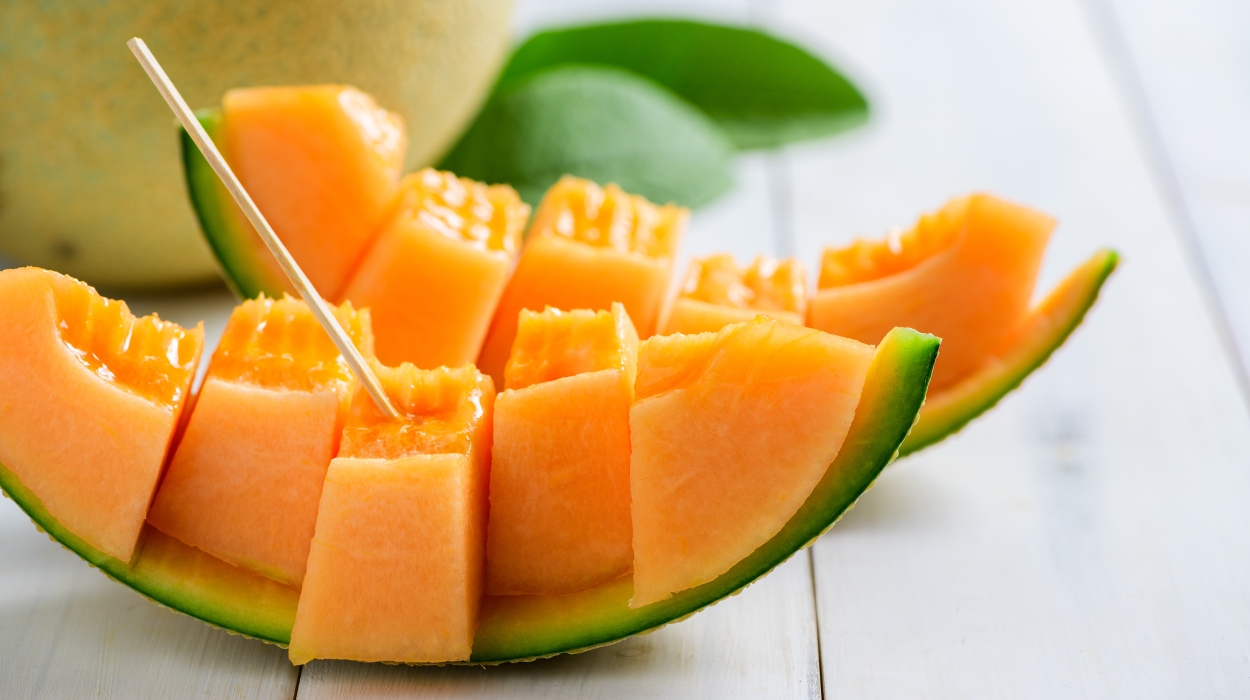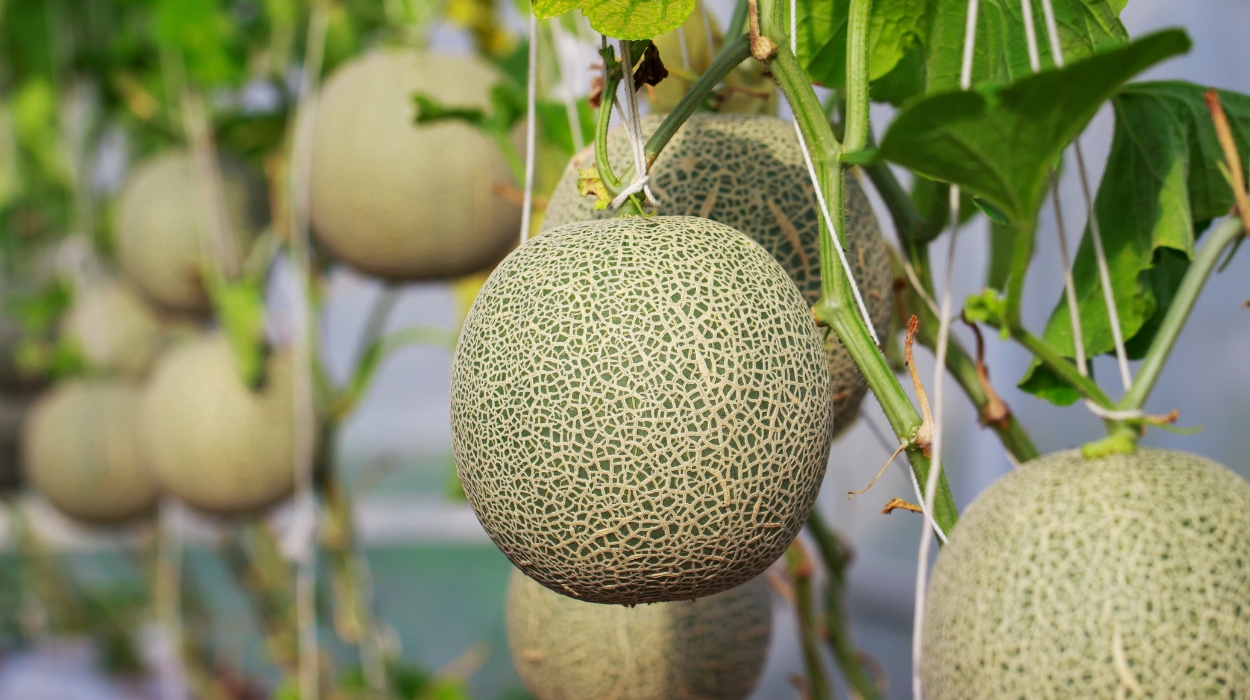Unlocking the secrets to sustainable weight loss often involves discovering the power of wholesome, nutrient-packed foods. Among these treasures of nature is the cantaloupe fruit. It is refreshing to eat, and you may have had it in your smoothies.
But is cantaloupe good for weight loss? Packed with essential nutrients and boasting a low-calorie count, cantaloupe offers numerous benefits for those looking to shed extra pounds.
In this article, we will explore the various ways in which cantaloupe can aid in weight management. From its high water content to its fiber-rich composition and metabolism-boosting properties, we will delve into the science-backed reasons why cantaloupe deserves a spot in your weight loss journey.
Is Cantaloupe Good For Losing Weight?
Yes, cantaloupe can be a great addition to a weight loss diet. It’s low in calories and high in water content, which can help you feel full without consuming too many calories.
Additionally, it’s a good source of fiber, which aids in digestion and can promote a feeling of fullness. Just remember, weight loss is often about balance and variety, so incorporating cantaloupe alongside other nutritious foods and maintaining a well-rounded diet and exercise routine is key.
Is Cantaloupe Good For Weight Loss?
Cantaloupe is a fruit quite similar to honeydew melons. It typically has a sweet, orange flesh with a musky aroma, while honeydew has a pale green flesh and a sweeter, milder taste.
Does cantaloupe help you lose weight? Cantaloupe can definitely be beneficial when it comes to staying healthy. But in what ways does it actually benefit weight loss? Here are some reasons why cantaloupe is one of the best fruits for weight loss:
Low In Calories
Cantaloupe is a weight-watcher’s dream. It is a low-calorie food with a high water content that makes it a hydrating, refreshing choice without packing on the calories. This is great because you need a calorie deficit for significant weight loss to occur.
A diced cup of cantaloupe contains 52 calories only.[1] So it doesn’t cause weight gain. Instead, it helps with weight loss.
Nutrient-Rich

Cantaloupe is a treasure trove of essential vitamins,[2] and its abundance of vitamins A and C is particularly noteworthy. Vitamin A, in the form of beta-carotene found in cantaloupe, supports vision,[3] and vitamin C plays a crucial role[4] in immune function and anti-inflammation.
Incorporating whole fruits like cantaloupe into your healthy diet offers a low-calorie, nutrient-dense, hydrating option that supports metabolism, immune function, and healthy, radiant skin. It’s a delicious and nutritious way to bolster your health as you work to lose fat.
Boosts Metabolism
Still about these key nutrients, cantaloupe’s nutrient profile can contribute to supporting a healthy metabolism. Vitamin C is known for its role in various metabolic processes. It aids in the synthesis of carnitine,[5] a compound required for the conversion of fat into energy.
Potassium, another essential mineral found in cantaloupe, plays a role in maintaining proper muscle function[6] and electrolyte balance. This mineral supports metabolism by aiding in converting food into energy and facilitating the transport of nutrients into cells.
Dietary Fiber
While cantaloupe might not be the first fruit that comes to mind when you think of fiber, it still contributes a decent amount to your daily intake. Its fiber content might not be as high as some other fruits, but every bit adds to the overall fiber tally for the day.
One cup of diced cantaloupes contains about 1.2 grams of fiber.[1] Dietary fiber’s role[7] in weight maintenance is crucial. Its ability to slow down digestion and its low glycemic index help control blood sugar levels and promote a feeling of fullness. This satiety factor after eating cantaloupe is key to preventing overeating and snacking on less healthy options throughout the day.
Amazing Health Benefits Of Cantaloupe
Cantaloupe is a low-calorie fruit that can support weight loss in several ways. It is low in calories, high in water and fiber, and rich in vitamins and minerals. But is cantaloupe good for you?
What other benefits does cantaloupe have? Here are some of its amazing health benefits:
Improved Eye Health
Cantaloupe is amazing for your eyes because it has a high beta-carotene content. Beta-carotene is a precursor to vitamin A, a crucial nutrient that supports optimal vision. Once eaten, the body converts beta-carotene into vitamin A, which is essential for maintaining healthy eyesight, particularly in low-light conditions.
Vitamin A helps the eyes produce pigments required for vision in dim light, aiding night vision and overall visual acuity. Moreover, this nutrient also plays a role in maintaining the eye’s surface tissues, causing a reduced risk of eye conditions[8] like age-related macular degeneration.
Better Heart Health
Cantaloupes are loaded with nutrients like potassium and fiber that work together to promote a healthier ticker. The high levels of potassium found in cantaloupe[9] help regulate blood pressure, reducing the risk[10] of hypertension and keeping your heart pumping smoothly.
Plus, the fiber content helps regulate cholesterol levels by preventing its absorption into the bloodstream. This means that indulging in some sweet slices of melon can potentially lower bad cholesterol levels and reduce the risk of heart disease.[11]
Skin Health

As we have mentioned, cantaloupe contains beta-carotene, which promotes skin health[12] by supporting cell turnover and repair. It aids in maintaining the skin’s integrity, contributing to a smoother and healthier complexion.
Vitamin A also helps reduce the effects of sun damage and supports the skin’s natural defenses. Cantaloupe’s vitamin C content is another boon for healthy skin. This powerful antioxidant plays a crucial role in collagen synthesis,[13] a protein essential for maintaining skin elasticity and firmness.
Collagen production declines with age, but vitamin C helps counteract this by supporting the body’s collagen production,[14] contributing to youthful-looking skin.
How To Use Cantaloupe For Weight Loss
There are many ways to enjoy cantaloupe for weight loss. To enjoy the benefits of cantaloupe for weight loss, you can eat it fresh, add it to a fruit salad, smoothies, or yogurt, or have it alongside your fruit and vegetable supplements. Here are a few recipes to try:
CANTALOUPE AND GREEK YOGURT PARFAIT
Ingredients:
- 1 cup diced cantaloupe.
- 1/2 cup Greek yogurt (plain or vanilla).
- 1 tablespoon honey or a drizzle of maple syrup (optional).
- Granola or nuts for topping (optional).
Instructions:
- Layer diced cantaloupe and Greek yogurt in a glass or bowl.
- Drizzle honey or maple syrup if desired.
- Top with granola or nuts for added crunch and nutrients.
CANTALOUPE SMOOTHIE
Ingredients:
- 1 cup diced cantaloupe.
- 1/2 cup unsweetened almond milk (or any preferred milk).
- 1/2 banana (optional for added creaminess).
- Handful of spinach or kale (optional for added nutrients).
- Greens powder (optional).
- Ice cubes (optional).
Instructions:
- Blend diced cantaloupe, almond milk, banana, and greens powder until smooth.
- Add ice cubes if desired for a colder smoothie.
These recipes offer diverse ways to enjoy the deliciousness of eating cantaloupe while reaping its weight-loss benefits. Feel free to tweak the ingredients to suit your taste preferences and dietary needs.
Picking Ripe Cantaloupe
Often called California cantaloupes, they thrive in the warm, sunny climate and are prized for their juicy, flavorful flesh. So, if you want to select cantaloupes, there are a few ways to pick the ripe ones. Here are some things to look out for:
- Smell: A ripe cantaloupe will have a sweet, pleasant aroma at the blossom end (opposite the stem). If it smells overly sweet or fermented, it might be overripe.
- Texture: Gently press the blossom end; it should yield slightly under pressure but not be too soft. The skin should have a slight give without being overly firm or mushy.
- Color: A ripe cantaloupe typically has a golden or creamy beige color under the net-like rind. Avoid greenish ones, as they are likely unripe.
Remember, cantaloupes don’t ripen much after they are harvested, so choosing a ripe one at the store is essential for the best flavor and texture when you’re ready to enjoy it!
Side Effects And Precautions To Take
While cantaloupes are generally safe and nutritious, there are a few considerations to keep in mind.
The first one is allergy. Some people might have allergic reactions to certain fruits, including cantaloupes. Symptoms can range from itching and swelling of the lips, mouth, or throat to more severe reactions. Be cautious when trying cantaloupe if you have a known allergy to other melons or fruits.
Then, like many fruits and vegetables, cantaloupes can contain pesticide residues. Washing them thoroughly before consumption or choosing organic options can reduce exposure. Properly wash the surface before cutting into the fruit to minimize the risk of foodborne illnesses.
Also, cantaloupes contain potassium, which might concern individuals with kidney issues or those on potassium-restricted diets. Consult a healthcare professional for guidance if you have specific health conditions.
As always, moderation is key. If you’re uncertain about any potential risks or interactions with your specific health conditions or medications, it’s best to consult with a healthcare professional or a registered dietitian for personalized guidance.
Conclusion
In your quest for a healthier lifestyle or weight management, the unassuming cantaloupe emerges as a potent ally. With its low-calorie content, high water and fiber, and abundant essential vitamins and minerals, this fruit is great for healthy weight control.
Its multifaceted benefits go beyond the scale, encompassing improved digestion, enhanced skin health, boosted immune system, and heart and eye health support. However, mindful consumption is key. While generally safe, some people might have allergies.
If you have specific health concerns, you should seek professional advice regarding potassium intake. Remember, sustainable weight management embraces diversity. So, aside from diet, also incorporate lifestyle changes and exercise into your weight loss regimen.
Frequently Asked Questions
Cantaloupe contains natural sugars but is relatively low in carbs compared to many fruits. A cup of diced cantaloupe has about 12 grams of carbs and 8 grams of natural sugar.
Cantaloupe’s low-calorie content can aid weight loss efforts, but it doesn’t target specific areas like belly fat. It’s part of a balanced diet supporting overall weight management.
A moderate portion, like one cup of diced cantaloupe, is healthy within a balanced diet. Overconsumption might contribute to excess sugar intake, so moderation is key.
Cantaloupe is an excellent choice for weight loss due to its low calorie, high water content, and fiber. Watermelon is also popular for its high water content and low calories, making it another good option.
 Evidence Based
Evidence Based
